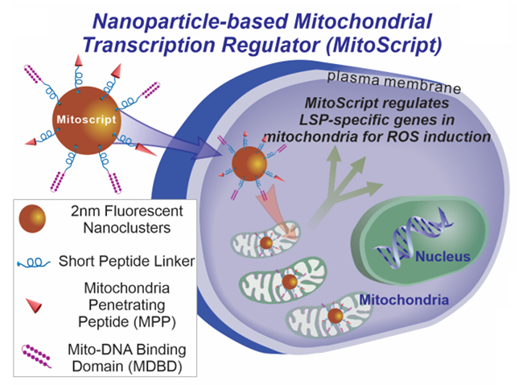

Schematic representation of MitoScript and its components
Invention Summary:
Abnormal mitochondrial DNA (mtDNA) transcription has been associated with a multitude of human diseases that requires both an effective and dynamic approach to control mitochondrial DNA. While nanoparticle(NP)-mediated drug delivery systems (DDSs) have emerged as a promising tool for developing novel therapeutic interventions for mt-associated diseases, their potential for direct, effective, and target-specific modulation of mitochondrial gene expression remains largely untapped.
Rutgers scientists have developed a NP–based synthetic mitochondrial transcription regulator, MitoScript, for the efficient, non-viral modification of mitochondrial DNA transcription. Notably, MitoScript can control mtDNA transcription in a human cell line in an effective and selective manner. The Mitoscript platform technology can potentially contribute to understanding the fundamental mechanisms of mitochondrial disorders and developing effective treatments for mitochondrial diseases..
Market Applications:
- Research tool for modulating mitochondrial gene expression
- Gene therapy agent towards:
- Cancer treatment
- Neurological disorder treatments
- Musculoskeletal diseases
- Metabolic diseases
Advantages:
- Great colloidal stability, excellent biocompatibility
- Efficient cell uptake, and selective mitochondria targeting
- Intrinsic NIR fluorescence for cellular tracking
- Avoidance of toxic organic solvents and immunogenic viral vectors
Intellectual Property & Development Status: Patent pending. Available for licensing and/or research collaboration. For any business development and other collaborative partnerships contact: marketingbd@research.rutgers.edu